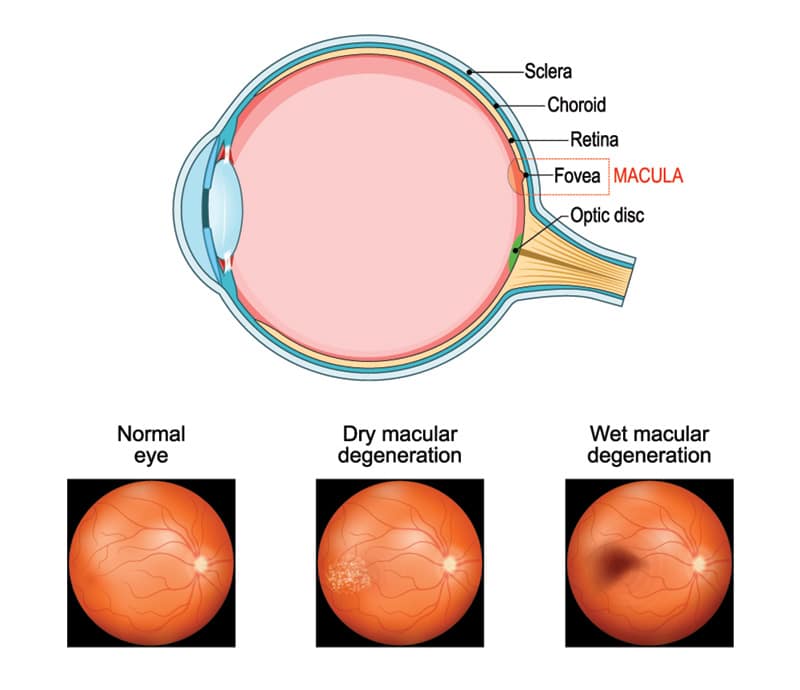Macular Degeneration
One of the most common eye conditions is Age-Related Macular Degeneration (AMD). At Wooster Eye Center, our team offers advanced diagnostic tools, the latest treatment options, and personalized management plans to help preserve your vision and maintain your quality of life.
What is Age-Related Macular Degeneration?
Age-Related Macular Degeneration is a progressive eye condition that affects the macula. The macula is the central part of the retina and is responsible for sharp, detailed vision.
As the name suggests, AMD typically occurs in older adults and can lead to a loss of central vision, impacting daily activities such as reading, driving, and recognizing faces. AMD is classified into two main types: dry and wet.
Understanding the differences between these types is crucial for proper diagnosis and treatment.
Dry Macular Degeneration
Dry AMD is the most common form of macular degeneration. It develops gradually over several years and is characterized by the following:
- Thinning of the macula
- Accumulation of small, yellow deposits called drusen beneath the retina
- Gradual loss of central vision
In dry AMD, the light-sensitive cells in the macula slowly break down, leading to a blurring or dimming of central vision. While there is currently no cure for dry AMD, certain lifestyle changes and nutritional supplements may help slow its progression.
Wet Macular Degeneration
Wet AMD, also known as neovascular AMD, is less common but more severe. It is responsible for a majority of severe vision loss associated with the condition.
Wet AMD is characterized by:
- Abnormal blood vessel growth beneath the retina
- Leakage of blood and fluid into the macula
- Rapid vision loss if left untreated
Wet AMD can develop suddenly and progress quickly, making early detection and treatment crucial for preserving vision.
What Are the Symptoms of Macular Degeneration?
Macular degeneration symptoms can vary depending on the type and stage of the condition. Early AMD may not cause noticeable symptoms, which is why regular eye exams are crucial, especially for those over fifty.
Common symptoms include:
- Blurry or fuzzy vision
- Difficulty recognizing faces
- Increased difficulty adapting to low light levels
- Straight lines appearing wavy or distorted
- A dark or empty area in the center of vision
- Colors appearing less vibrant
- Difficulty reading or performing tasks that require fine detail
It’s important to note that AMD doesn’t affect peripheral vision. If you experience any sudden changes in your vision, contact your eye doctor at Wooster Eye Center immediately, as this could indicate a progression to wet AMD.

What Causes Macular Degeneration?
While the exact cause of AMD is not fully understood, several factors contribute to its development:
While some risk factors, like age and genetics, can’t be changed, others can be modified through lifestyle choices. Maintaining a healthy diet rich in leafy greens and fish, exercising regularly, avoiding smoking, and protecting your eyes from UV light can help reduce your risk of developing AMD.
How is Macular Degeneration Treated?
Treatment for macular degeneration depends on the type and stage of the condition. While there’s no cure for AMD, various treatments can help slow its progression and manage symptoms.
Dry AMD Treatments
Dry AMD, the most common form, progresses slowly and currently has no medical cure. However, several approaches can help manage the condition and potentially slow its advancement:
Treatment for Wet AMD
Wet AMD typically requires more aggressive treatment to prevent severe vision loss. The primary goal is to stop the growth of abnormal blood vessels and prevent leakage.
Retinal Injections
The most common and effective treatment for wet AMD involves injections of anti-vascular endothelial growth factor (anti-VEGF) drugs directly into the eye. At Wooster Eye Center, our experienced eye doctors use a medication called Avastin. Avastin is widely used for wet AMD due to its effectiveness and lower cost. This injection works by blocking the growth of abnormal blood vessels and reducing fluid leakage in the retina. The procedure has to be repeated monthly or as needed, depending on the individual case. Your eye doctor will determine which treatment option is best for your unique case. If retinal injections are recommended, they will develop a specific timeline for a treatment plan.
At Wooster Eye Center, we offer comprehensive care for patients with AMD, including the latest treatment options and ongoing support. Regular check-ups are crucial for monitoring the condition and adjusting treatment plans as needed. Remember, early detection and treatment are key to managing AMD and preserving vision. If you’re over fifty or have risk factors for AMD, schedule regular eye exams with our experienced team at Wooster Eye Center in Wooster, OH! We’re here to help you maintain healthy vision throughout your life.

